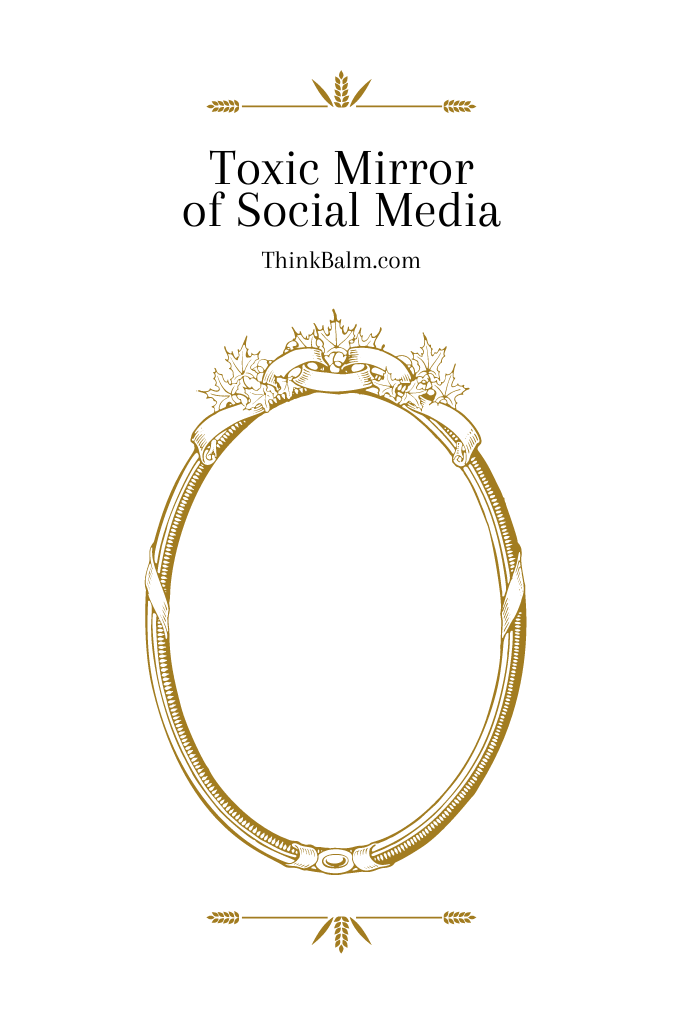
In today’s digital age, it’s hard to escape the influence of social media and its profound impact on our lives. One of the prevalent phenomena we encounter is how social media is a toxic mirror, reflecting and amplifying our insecurities and self-doubts.
If you spend any time in the digital world, you know that social media reflects insecurities, creating a toxic mirror. It distorts reality, affecting mental health.
Today, we’re delving into the intricate world of social media and its often-unseen effects on our mental and emotional well-being.
You might have heard the phrase “social media is a toxic mirror” floating around, but what exactly does that mean? Let’s unpack it together.
How Social Media Is a Toxic Mirror: Understanding Its Impact on Mental Health
The Reflective Nature of Social Media
Social media platforms have become integral parts of our daily lives. They serve as digital landscapes where we showcase our lives, thoughts, and experiences to the world. However, beneath the glossy surface lies a more complex reality. Social media has the uncanny ability to reflect and magnify our insecurities, doubts, and anxieties.
Related Reading: Advantages and Disadvantages of Instagram
Comparison Culture: A Double-Edged Sword
One of the primary ways in which social media acts as a toxic mirror is through comparison culture. As you scroll through your feed, it’s easy to fall into the trap of comparing your life to the carefully curated highlight reels of others. Whether it’s someone’s picture-perfect vacation photos or their seemingly flawless appearance, constant exposure to idealized images can leave you feeling inadequate and discontent.
Related Reading: Advantages and Disadvantages of TikTok
Unrealistic Beauty Standards
In the realm of social media, beauty standards are often unattainable and unrealistic. Platforms are flooded with airbrushed images and meticulously crafted selfies that perpetuate narrow definitions of beauty. This constant bombardment can lead to body image issues, low self-esteem, and even disordered eating patterns as individuals strive to conform to these unattainable ideals.
Related Reading: Advantages and Disadvantages of Facebook
Fear of Missing Out (FOMO)
Another way in which social media acts as a toxic mirror is through the pervasive fear of missing out (FOMO). As you scroll through posts detailing your friends’ social gatherings, achievements, and milestones, it’s natural to feel a pang of envy or inadequacy. This fear of missing out can take a toll on your mental health, fostering feelings of loneliness, isolation, and inadequacy.
Let’s learn more about how social media is a toxic mirror.
Validation and Self-Worth
Likes, comments, and shares have become the currency of social media validation. However, this constant quest for external validation can have detrimental effects on your self-worth. Relying on the fleeting approval of others for validation can erode your sense of self and leave you feeling empty and unfulfilled.
The Perils of Perfectionism
In the age of social media, perfectionism reigns supreme. From meticulously curated Instagram feeds to flawlessly edited YouTube videos, the pressure to present a perfect facade can be overwhelming. This relentless pursuit of perfection can lead to anxiety, burnout, and a distorted sense of reality as individuals strive to maintain an unrealistic image.
Coping with the Toxicity
So, how can you navigate the treacherous waters of social media without succumbing to its toxic allure? Here are a few tips to help you maintain a healthy relationship with social media:
- Practice Mindfulness: Be mindful of your social media usage and its impact on your mental health. Take breaks when needed and engage in activities that nourish your soul. For more tips on how to practice mindfulness, check out this guide to Mindful Monday.
- Curate Your Feed: Surround yourself with content that uplifts and inspires you. Unfollow accounts that trigger negative emotions or perpetuate unrealistic standards.
- Focus on Real Connections: Cultivate meaningful connections offline and prioritize quality time with friends and loved ones. Remember that true happiness lies in genuine human connection, not virtual likes and shares.
- Celebrate Imperfection: Embrace your flaws and imperfections as part of what makes you uniquely beautiful. Remember that life is messy, and it’s okay not to have it all together all the time.
- Seek Support: If social media is taking a toll on your mental health, don’t hesitate to seek support from a trusted friend, family member, or mental health professional.
Related Reading: Blogsnark Reddit
Conclusion: How Social Media is a Toxic Mirror
In conclusion, social media can indeed act as a toxic mirror, reflecting back our insecurities, fears, and vulnerabilities. However, by being mindful of our usage, curating our feeds, and prioritizing real connections, we can mitigate its negative impact and reclaim control over our digital lives.
Remember, you are more than the sum of your likes and followers. Your worth extends far beyond the confines of a digital screen. So, go forth, dear reader, and navigate the digital landscape with grace, authenticity, and self-compassion.
Readers, please share this guide so social media users discover how social media is a toxic mirror.
Comments
One response to “How Social Media Is a Toxic Mirror (2024)”
Your pet photos bring so much joy to my feed! The love and happiness captured in each picture are infectious. Give your furry friend some extra pets for me!